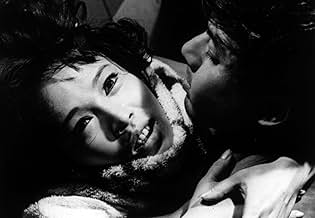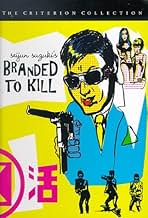CALIFICACIÓN DE IMDb
7.2/10
11 k
TU CALIFICACIÓN
Después de una misión mal ejecutada, un sicario entra en conflicto con su organización y, en particular, con otro enigmático y peligroso sicario.Después de una misión mal ejecutada, un sicario entra en conflicto con su organización y, en particular, con otro enigmático y peligroso sicario.Después de una misión mal ejecutada, un sicario entra en conflicto con su organización y, en particular, con otro enigmático y peligroso sicario.
- Dirección
- Guionistas
- Elenco
- Premios
- 1 premio ganado en total
Jô Shishido
- Gorô Hanada
- (as Joe Shishido)
Annu Mari
- Misako Nakajô
- (as Anne Mari)
Akira Hisamatsu
- Ophthalmologist
- (as Kôsuke Hisamatsu)
Kôji Seyama
- Restaurant Guest
- (as Takashi Seyama)
Opiniones destacadas
Wow, I thought the Japanese turned out some weird stuff nowadays. That lame crap has nothing on this wacky thing, which requires about 57 viewings to make any kind of narrative sense.
Jo Shishido (who has cheek implants (!!) that make him look like a chipmunk) is the third best killer in Japan. Apparently, all assassins in Japan do, other than kill people, is try to better themselves in the rankings. It's much like Pokemon, in a way. Jo strives to be number one, but, not only does he have to get past a bunch of backstabbers, he has to find the #1 Phantom, the high man on the totem. And when he does, it's rip roarin' nonsense time!
It's hard to tell if this is a work of genius or of pure insanity. There's no real narrative; more like a bunch of scenes held together by the fact they're all in the same movie. Some of the stuff is so nutty, it's hard not to call it brilliant, like when Jo finally does meet Phantom and they have a sit-down, Phantom pisses his pants rather than get up and take his eyes off Jo. Or the hit that gets foiled by a butterfly. Or Jo's girlfriend's obsession with dead bugs, which lay in piles on the floor. Or the shocking amount of sex and violence in a movie made in 1967. It's really no surprise that the director had his contract summarily terminated when the studio watched this: it is the weirdest movie to come out of Japan in 1967. Or maybe ever. Be prepared to watch more than once.
Jo Shishido (who has cheek implants (!!) that make him look like a chipmunk) is the third best killer in Japan. Apparently, all assassins in Japan do, other than kill people, is try to better themselves in the rankings. It's much like Pokemon, in a way. Jo strives to be number one, but, not only does he have to get past a bunch of backstabbers, he has to find the #1 Phantom, the high man on the totem. And when he does, it's rip roarin' nonsense time!
It's hard to tell if this is a work of genius or of pure insanity. There's no real narrative; more like a bunch of scenes held together by the fact they're all in the same movie. Some of the stuff is so nutty, it's hard not to call it brilliant, like when Jo finally does meet Phantom and they have a sit-down, Phantom pisses his pants rather than get up and take his eyes off Jo. Or the hit that gets foiled by a butterfly. Or Jo's girlfriend's obsession with dead bugs, which lay in piles on the floor. Or the shocking amount of sex and violence in a movie made in 1967. It's really no surprise that the director had his contract summarily terminated when the studio watched this: it is the weirdest movie to come out of Japan in 1967. Or maybe ever. Be prepared to watch more than once.
Branded to Kill is by far Suzuki's best film. It is my personal favorite crime film. Joe Shishido in his role as Hanada Goro, with his dark black sunglasses and Mauser M712 is one of the coolest characters ever created. The movie has everything, violence, shootouts, car chases, sex, and much much more. The film would likely have been shot in color, however Seijun Suzuki was prohibited from shooting in color due his wild use of colors in past films. The film is still a work of art, and looks beautiful in black and white. The best way I can describe this film is maybe a cross between Alfred Hitchcock and Sergio Leone. An excellent crime thriller not to be missed.
Seijun Suzuki refers to his films as "entertainment" and without critical merit. Yet, this was somewhat tongue in cheek as he stated that critics feel a movie must have a "moral or some social commentary" to be worthy of attention. Be that as it may, "Branded to Kill" is simply a fantastic achievement. Suzuki was working with both a lead man and a script provided to him by the Nikkatsu Corporation. As such, when you evaluate his films, you do so by focusing on the technical merits. Personally, I find his disconnected editing, and surreal lighting styles to be amazing. Suzuki's skill turns what is otherwise a laughable boiler plate film noir into something more. The lighting and editing make the exclamations that the script doesn't, and the decision to shoot the final scene in a boxing ring is brilliant.
It was entertaining to watch person after person jump up and down about the originality of "Ghost Dog" with no mention of the fact that Jarmusch lifted one of the assassination sequences unchanged from "Branded to Kill". Hopefully as more of Suzuki's work comes to DVD, people and critics alike will recognize a blatant tribute when it is given. Suzuki deserves them all.
It was entertaining to watch person after person jump up and down about the originality of "Ghost Dog" with no mention of the fact that Jarmusch lifted one of the assassination sequences unchanged from "Branded to Kill". Hopefully as more of Suzuki's work comes to DVD, people and critics alike will recognize a blatant tribute when it is given. Suzuki deserves them all.
Branded to Kill is a wonderfully peculiar Japanese hit-man film. Not only has it worked as an inspiration for many directors, but it's also an experience that, I feel, everyone should get to have. While it didn't work for me as well as I had hoped, it is so unique that it's hard not to like it.
Branded to Kill starts off great. The little information it gives isn't enough to have a good idea of what's going on, and the early intensity and pace shrouded in mystery work wonderfully. While it is clear from the very beginning that this isn't going to be your typical crime flick, the film takes its time to really get going with the peculiarities. At first, it feels like any old hit-man movie, and I found those moments to be the most effective. That's not to say that the movie doesn't have great moments throughout, it's just that it doesn't deliver them as effectively as it did in the beginning, but more on that later. The film starts with a fast-paced action sequence that introduces us to the main character, the No. 3 hit-man in Japan. As we get to know him, we learn that he isn't what you would call a typical hit-man. He is, for example, obsessed with the smell of cooked rice, one of his many quirks. As we get to know him, we also get an idea of what Branded to Kill is really going to be like.
While, at first, it might seem that there is nothing peculiar going on, the movie quickly throws that presumption out the window. As more characters are introduced, and as the story progresses, it becomes evidently clear that there is much more there than first meets the eye. And although these oddities are what make this film what it is, and the thing that lifted it into the cult following it has, I found them to be the downfall of it, as well. While the many curiosities, like No. 3's fetish of cooked rice, or the jazz soundtrack, or even the very open and aggressive portrayal of erotica work well and give the film an edge that others like it don't have, they, unfortunately, make it also feel unfocused. I feel that there is a limit to how much you can play with things that normally wouldn't belong to such a film, and still get away with. In the case of Branded to Kill, that line was crossed, at least as far as my enjoyment went. The resulting product, while certainly interesting and unique, lacked focus and coherency.
However, while most of the film felt lacklustre, thankfully it found its stride towards the end. Indeed, as good as the beginning was, I think that the ending was even better. It's filled with tension and uncertainty, and quite frankly, it feels like the movie finally found the mood it was trying to achieve from the very get-go. As such, I find it very unfortunate that the rest of the film wasn't able to find its tempo and flow. It felt like there were so many ideas that were crammed into Branded to Kill that it would've been nearly impossible to create a film that felt complete, especially when you consider the short runtime. Apart from the beginning and the end, the rest felt like a series of mini-movies each with their own idea. Accordingly, it was difficult to fall into the film and let it take me for a ride. I was constantly thrown out of the idea and scene just as I was getting settled into it. While this approach might've worked had there been a clearer narrative between each scene, the sheer number of ideas and stories being told made it difficult to appreciate them.
The more I think about, the more I feel like Branded to Kill just wasn't for me. While I appreciate the efforts it took to experiment, I found myself wishing for a clearer narrative. However, there is no denying the uniqueness it has. Although I won't be watching it again any time soon, I'm glad that I have seen it. It's clear why it has inspired so many directors, and why it has garnered such a large cult following around the world.
Branded to Kill starts off great. The little information it gives isn't enough to have a good idea of what's going on, and the early intensity and pace shrouded in mystery work wonderfully. While it is clear from the very beginning that this isn't going to be your typical crime flick, the film takes its time to really get going with the peculiarities. At first, it feels like any old hit-man movie, and I found those moments to be the most effective. That's not to say that the movie doesn't have great moments throughout, it's just that it doesn't deliver them as effectively as it did in the beginning, but more on that later. The film starts with a fast-paced action sequence that introduces us to the main character, the No. 3 hit-man in Japan. As we get to know him, we learn that he isn't what you would call a typical hit-man. He is, for example, obsessed with the smell of cooked rice, one of his many quirks. As we get to know him, we also get an idea of what Branded to Kill is really going to be like.
While, at first, it might seem that there is nothing peculiar going on, the movie quickly throws that presumption out the window. As more characters are introduced, and as the story progresses, it becomes evidently clear that there is much more there than first meets the eye. And although these oddities are what make this film what it is, and the thing that lifted it into the cult following it has, I found them to be the downfall of it, as well. While the many curiosities, like No. 3's fetish of cooked rice, or the jazz soundtrack, or even the very open and aggressive portrayal of erotica work well and give the film an edge that others like it don't have, they, unfortunately, make it also feel unfocused. I feel that there is a limit to how much you can play with things that normally wouldn't belong to such a film, and still get away with. In the case of Branded to Kill, that line was crossed, at least as far as my enjoyment went. The resulting product, while certainly interesting and unique, lacked focus and coherency.
However, while most of the film felt lacklustre, thankfully it found its stride towards the end. Indeed, as good as the beginning was, I think that the ending was even better. It's filled with tension and uncertainty, and quite frankly, it feels like the movie finally found the mood it was trying to achieve from the very get-go. As such, I find it very unfortunate that the rest of the film wasn't able to find its tempo and flow. It felt like there were so many ideas that were crammed into Branded to Kill that it would've been nearly impossible to create a film that felt complete, especially when you consider the short runtime. Apart from the beginning and the end, the rest felt like a series of mini-movies each with their own idea. Accordingly, it was difficult to fall into the film and let it take me for a ride. I was constantly thrown out of the idea and scene just as I was getting settled into it. While this approach might've worked had there been a clearer narrative between each scene, the sheer number of ideas and stories being told made it difficult to appreciate them.
The more I think about, the more I feel like Branded to Kill just wasn't for me. While I appreciate the efforts it took to experiment, I found myself wishing for a clearer narrative. However, there is no denying the uniqueness it has. Although I won't be watching it again any time soon, I'm glad that I have seen it. It's clear why it has inspired so many directors, and why it has garnered such a large cult following around the world.
A bizarre yakuza flick with a taste for over-the-top visuals and modern stylistics, Branded to Kill follows the strange day-to-day existence of an expert hit-man who carries out his orders with steely determination and impassive cool. All hell breaks loose, however, when a butterfly alighting on his rifle scope results in a botched job -- and a death sentence for the screw-up. Joe Shishido, with his collagen-enhanced cheekbones, makes a terrific anti-hero whose unusual quirks (Suzuki reasoned that a man obsessed with the scent of warm rice would signal to audiences that this guy was quintessentially Japanese) instantly endear him to newly-made fans. Branded to Kill is wild fun, and has been favorably and frequently compared to the work of artists as different as John Woo and David Lynch -- which makes it all the more exhilarating when you realize it was made in 1967.
¿Sabías que…?
- TriviaWhen Nikkatsu studio executives saw the finished product, they thought it was too terrible to be released, so they shelved it. Seijun Suzuki along with others in the film business, film critics, and students protested in unfairness since, by contract, Nikkatsu was supposed to release the finished film theatrically. It went to court, with a ruling in favor of the director. Nikkatsu had to pay for damages and have the film released. Suzuki's contract with Nikkatsu was terminated, and with the bad reputation, was unable to work on a feature film for the next 10 years.
- Citas
Misako Nakajô: My dream is to die.
- ConexionesFeatured in Seijun Suzuki | TCM (2013)
- Bandas sonorasKoroshi no buruusu (Killing Blues)
Lyrics by Hachiro Guryu (Yasuaki Hangai, Takeo Kimura, Yutaka Okada, Chûsei Sone, Seijun Suzuki, Yôzô Tanaka, Seiichiro Yamaguchi and Atsushi Yamatoya)
Music by Kagehisa Kusui
Sung by Atsushi Yamatoya
Selecciones populares
Inicia sesión para calificar y agrega a la lista de videos para obtener recomendaciones personalizadas
- How long is Branded to Kill?Con tecnología de Alexa
Detalles
- Tiempo de ejecución
- 1h 31min(91 min)
- Color
- Relación de aspecto
- 2.35 : 1
Contribuir a esta página
Sugiere una edición o agrega el contenido que falta




























